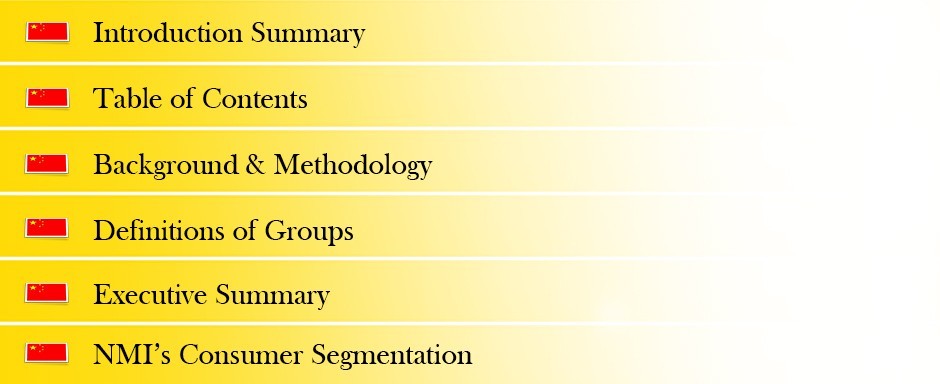China 2019 Supplement/OTC/Rx Report

90+ pages of NMI research, study supported, providing current consumer insights with data and analysis, including charts, graphs, illustrations!
Site License: Includes PDF, PPT with access to charts and site rights for internal network usage across one company BRAND/location.
Price: $4,500 Order Report
Introduction Overview
Since 2005, NMI’s Global Dietary Supplements/OTC/Rx Consumer Studies are devoted to understanding consumer attitudes and behaviors and their impact on market dynamics!
Natural Marketing Institute (NMI) is pleased to present its China 2019 Supplements/OTC/Rx Report. This comprehensive report analyzes the dietary supplement market from the consumer perspective with 90+ pages of consumer attitudes, behaviors and product usage patterns surrounding dietary supplements, over-the-counter medication and pharmaceuticals.
This research uncovers how consumers integrate this mix of self-care methods into their current lifestyle and reveals the motivations and the challenges they encounter in their pursuit of health. Many factors are driving multiple categories across China. For example, aging drives condition-specific needs, and increased consumer knowledge and desire for specific product features and benefits drive sustainable, organic, and plant-based options. The need for education and an understanding of the drivers that affect consumer behavior patterns has never been stronger.
The overall objectives of the report are to develop unique and specific consumer insight to maximize client learnings and opportunities in terms of attracting new consumers, increasing compliance and developing compelling messaging and communications strategies.
Some of the topics covered in the report:
Top “White Space” Opportunity areas
The size and demographic composition of Consumer groups
Highly engaged consumer segments in supplement use
Health and Wellness composition of various supplement user groups
‘Likely User’ groups to buy supplements –Condition management
Understanding NMI’s Health & Wellness consumer segmentation
Demographic Profile of the Health & Wellness Segments
and much more!
Background and Methodology
Country: China
Background: In Quarter 1 of 2019, NMI conducted an online quantitative survey to understand China attitudes and usage patterns with regard to dietary supplements in order to assist companies with their health and wellness initiatives on a global basis.
Methodology: Online
Sample size: 1,000 +/- general population respondents
Data collection: March 2019 – April 2019
Report Published: July 2019

Definitions of Consumer Groups within the Report
GP – General Population Adults 18+
Millennials – born 1977-1997 (Ages 21-41)
Young Millennials – born 1991-1997 (Ages 21-27)
Older Millennials – born 1977-1990 (Ages 28-41)
Gen X – born 1965-1976 (Ages 42-53)
Boomers – born 1946-1964 (Ages 54-72)
Matures – born 1900-1945 (Ages 73+)

Understanding NMI’s consumer segmentation within the China general population allows marketers to optimize their target products and messages
NMI’s Consumer Segmentation
NMI’s Global Health and Wellness consumer segmentation reveals five well-defined segments with distinctive paths toward health and wellness
This proprietary global health and wellness segmentation, based on more than 40 variables, measures commonalities and differences between five distinct consumer groups using k-means cluster analysis. The comprehensive statistical modeling process used to derive NMI’s Health and Wellness consumer segmentation is based on the following techniques and methodologies:
- Exploratory and confirmatory factor analysis of nearly 200 measures of consumer attitudes and behaviors regarding health and wellness, organic products, supplements, exercise, and many other topics. The analysis identified more than 25 potential factors.
- The identification of 31 measures from the factor analysis that best represented each of the potential factors and maintained consistency with the previous years’ segmentation solution.
- K-means cluster analysis which examined numerous potential solutions to determine which segmentation model provided the optimal solution, based on the following criteria:
- Maximum differentiation between consumer groups
- Maximum homogeneity within each consumer group
- NMI’s Health and Wellness Segmentation tool has 92% accuracy in predicting segment membership.
The analysis determined that a five-cluster solution was optimal. The five segments listed below are mutually exclusive. Within each segment, the key attitudinal drivers of health and wellness exert unique levels of influence.

Table of Contents


Consumer’s use of supplements in the past 30 days
Consumer confidence in supplementation to maintain their health
Consumers’ perception about the foods they eat
Consumers are managing an array of conditions
Top health conditions Supplement Users are currently managing
Use of condition specific supplements
Consumer likelihood to use supplements to manage and prevent a whole host of conditions. (Top and Second Tiers)
Preventative positioning and messaging
Messaging - boosting consumer confidence
Lower confidence in some specific supplements

% of consumers currently using supplements
% of consumers exhibiting lapsed usage
Looking at more specific supplement use; past 30 days average number of types used
Supplement growth over the past 5 years
Supplement User profile- from Light to Heavy each day
Reasons for lowered usage
Primary supplements used by consumers; Tier 1 and Tier 2
Emerging supplements
Past 3 year growth of top supplements
Variations in generational use
% of Supplement Users using probiotics
Plant-based protein dynamics

Attributes important in purchase decision
Bioavailability, absorption, “size of the dose”
Importance of Messaging in the second tier of important attributes
Prescription medications perceptions and credibility vs. Supplements
Influences on purchase supplements
Social media website influences on supplement purchase decisions
Confidence in Practicioners
Personalized supplements
Assurance of ingredient content and health benefit claims
Country of origin impact on purchase
Levels of confusion regarding supplements
Consumer willingness to pay premium pricing

Innovative formats solutions
Preferred supplement formats
Growth in alternative delivery formats
Preference for plant-based supplements
Demand for sustainable and e-friendly ingredients
Segments showing strong orientation toward natural and organic
Certifications and level of importance

Primary reasons for lapsed usage
Opportunities to boost perceptions of effectiveness and increase compliance
The main barrier to supplement use among non-users
Demographic Profile of Supplement Users and Lapsed Users

Where do most consumers shop for supplements?
Internet shopping
Channel shopping growth now and future
Top retailers
Top brands dominating the Market
Average Monthly spend on supplements among Supplement Users
Understanding of a quality and price sensitivity

Physicians and prescription medications
Conditions for which Supplement Users are taking prescription medications
Generational variations in the conditions for which they have used a prescription medication
Consumer dilemma regarding prescription medications
Concern with prescription medication interaction with supplements
Supplement User spending on prescription medications vs. supplements
Nutrient depletion due to prescription use
Supplement Users spending on over-the-counter medications

For more information, kindly contact Steve French.
